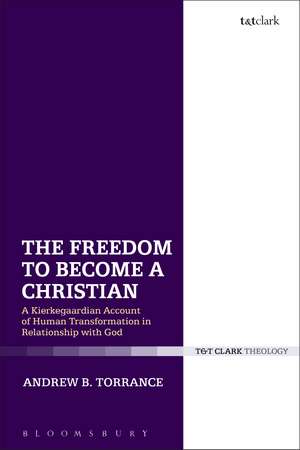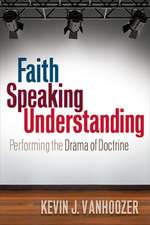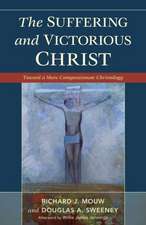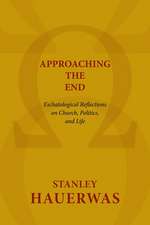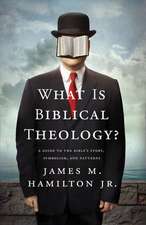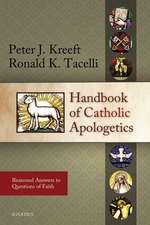The Freedom to Become a Christian: A Kierkegaardian Account of Human Transformation in Relationship with God
Autor Dr Andrew B. Torranceen Limba Engleză Hardback – 24 feb 2016
| Toate formatele și edițiile | Preț | Express |
|---|---|---|
| Paperback (1) | 237.02 lei 6-8 săpt. | |
| Bloomsbury Publishing – 25 iul 2018 | 237.02 lei 6-8 săpt. | |
| Hardback (1) | 773.45 lei 6-8 săpt. | |
| Bloomsbury Publishing – 24 feb 2016 | 773.45 lei 6-8 săpt. |
Preț: 773.45 lei
Preț vechi: 1112.72 lei
-30% Nou
Puncte Express: 1160
Preț estimativ în valută:
148.04€ • 152.56$ • 124.98£
148.04€ • 152.56$ • 124.98£
Carte tipărită la comandă
Livrare economică 01-15 martie
Preluare comenzi: 021 569.72.76
Specificații
ISBN-13: 9780567661210
ISBN-10: 0567661210
Pagini: 232
Dimensiuni: 156 x 234 x 14 mm
Greutate: 0.5 kg
Editura: Bloomsbury Publishing
Colecția T&T Clark
Locul publicării:London, United Kingdom
ISBN-10: 0567661210
Pagini: 232
Dimensiuni: 156 x 234 x 14 mm
Greutate: 0.5 kg
Editura: Bloomsbury Publishing
Colecția T&T Clark
Locul publicării:London, United Kingdom
Caracteristici
Torrance explores Kierkegaard's exceptional insight into the fundamental theological and pastorally critical question: how are we to understand the process of becoming a Christian?
Notă biografică
Andrew Torrance is a Research Fellow in the School of Divinity, University of St Andrews, UK, and Project Leader for a major Templeton grant.
Cuprins
Acknowledgements Abbreviations Introduction Chapter One: The Communication of the Christian Truth Chapter Two: The Possibility of Reconciliation Chapter Three: The Orientation of a Life Lived in Relationship with God Chapter Four: Christian Practice in Relationship with GodChapter Five: The Freedom to Become a Christian in Relationship with God Conclusion BibliographyIndex
Recenzii
What is at the center of Kierkegaard's diverse writings? Kierkegaard claimed that his whole authorship pertained to the issue of becoming a Christian, and Torrance (School of Divinity, Univ. of St. Andrews, UK) takes him at his word. He focuses on two of Kierkegaard's questions: How does a human become a Christian? What is God's relation to a human in the process of becoming a Christian? Conversion, in Torrance's reading of Kierkegaard, is a process over time and cannot be reduced to a temporal instant, even if it begins at a specific time. According to Torrance, Kierkegaard holds that "as [a human] stands before the God who is love, she becomes transformed by this love, and thereby receives the freedom to love, which, up until that point, was an impossibility." This may fit with a Lutheran theology of the bondage of the will, but some will seek a cooperative approach in which a human must freely and sympathetically cooperate with the divine love on offer for there to be conversion and transformation before God. The issue concerns how much human agency figures in conversion and transformation. Torrance develops his interpretation with considerable historical and thematic detail. Summing Up: Highly recommended. Upper-division undergraduates and above.
Among the current swell of literature that reads Kierkegaard through an avowedly theological lens, Andrew Torrance has provided an important and lucidly expressed book which promises to become a key text for future Kierkegaardian theology.
An important contribution to Protestant theological ethics.
In this work Andrew Torrance gives a penetrating account of Kierkegaard's understanding of what it means to become a Christian. It is a process that is entirely dependent upon God's grace, but that grace enables and requires a reciprocal relationship between God and human beings. Becoming a Christian is neither a matter of coming to believe certain propositions; nor is it a development of some natural human capacity. Rather it is coming to know God, becoming part of God's family through Jesus of Nazareth through the work of the Holy Spirit. This is a powerful,clearly written book. It shows a deep understanding of Kierkegaard's writings and a masterful knowledge of the secondary literature.
Challenging common individualist and voluntarist accounts of Kierkegaard, Andrew Torrance offers a fresh and illuminating portrayal of Kierkegaard's vision of what it means to "become a Christian," not as a solitary Promethean act of will and self-discovery, but as a transformative journey grounded in the grace and love of the living God present in and through Jesus Christ. For Torrance, the key to Kierkegaard's theological vision is not the solitary self, but God's personal transformative communion that draws forth the human response of devotion. This insight allows Torrance, in one of the best recent sustained accounts of Kierkegaard on human freedom, to show Kierkegaard's relevance to a host of perennial theological questions on grace and freedom, divine and human agency, the dynamics of repentance and conversion, the relation of faith and practice, and the "happy passion" of faith in response to God's gracious love. This book deserves careful reading not only by students of Kierkegaard, but also by anyone interested in what it means to "become a Christian."
Andrew Torrance's wonderfully compelling volume illumines the very core of Kierkegaard's theological project. It serves as a much-needed antidote to the lingering perception of Kierkegaard as a champion of radical individual autonomy, heroic acts of will, and religious subjectivity divorced from any claims about a divine reality. Torrance's careful reading of Kierkegaard's mysterious texts draws attention to an absolutely crucial but under-appreciated aspect of his theological vision: the activity of a personal God who, through Jesus Christ, draws human beings into a transformative intersubjective relationship. For Torrance, everything that Kierkegaard says about faith, passion, and inwardness presupposes the prior reality of God's gracious solicitation of a personal encounter with the individual. It is this focus on the interpersonal aspect of faith that makes Torrance's account of Kierkegaardian faith so unique. Torrance's careful exploration of this divine/human interaction enables him to show how Kierkegaard can emphasize the centrality of grace without minimizing the individual's involvement in the on-going process of transformation, or dichotomizing divine and human agencies. Torrance presents a Kierkegaard who is theocentric, Christocentric, and convinced of the reality of God's initiative in drawing persons into a radically new mode of life.
The question of how one becomes a Christian was the primary focus of Kierkegaard's authorship. Foremost among the obstacles to faith are the presuppositions of modern culture, and the stubbornness with which we resist divine grace. Andrew Torrance offers here a searching examination of Kierkegaard's account and of his enduring challenge to those who want to establish Christian faith on some basis other than that given to us in Jesus Christ. Torrance's work will be valuable reading both for the seasoned scholar and for those who are just beginning their exploration of Kierkegaard's work.
Among the current swell of literature that reads Kierkegaard through an avowedly theological lens, Andrew Torrance has provided an important and lucidly expressed book which promises to become a key text for future Kierkegaardian theology.
An important contribution to Protestant theological ethics.
In this work Andrew Torrance gives a penetrating account of Kierkegaard's understanding of what it means to become a Christian. It is a process that is entirely dependent upon God's grace, but that grace enables and requires a reciprocal relationship between God and human beings. Becoming a Christian is neither a matter of coming to believe certain propositions; nor is it a development of some natural human capacity. Rather it is coming to know God, becoming part of God's family through Jesus of Nazareth through the work of the Holy Spirit. This is a powerful,clearly written book. It shows a deep understanding of Kierkegaard's writings and a masterful knowledge of the secondary literature.
Challenging common individualist and voluntarist accounts of Kierkegaard, Andrew Torrance offers a fresh and illuminating portrayal of Kierkegaard's vision of what it means to "become a Christian," not as a solitary Promethean act of will and self-discovery, but as a transformative journey grounded in the grace and love of the living God present in and through Jesus Christ. For Torrance, the key to Kierkegaard's theological vision is not the solitary self, but God's personal transformative communion that draws forth the human response of devotion. This insight allows Torrance, in one of the best recent sustained accounts of Kierkegaard on human freedom, to show Kierkegaard's relevance to a host of perennial theological questions on grace and freedom, divine and human agency, the dynamics of repentance and conversion, the relation of faith and practice, and the "happy passion" of faith in response to God's gracious love. This book deserves careful reading not only by students of Kierkegaard, but also by anyone interested in what it means to "become a Christian."
Andrew Torrance's wonderfully compelling volume illumines the very core of Kierkegaard's theological project. It serves as a much-needed antidote to the lingering perception of Kierkegaard as a champion of radical individual autonomy, heroic acts of will, and religious subjectivity divorced from any claims about a divine reality. Torrance's careful reading of Kierkegaard's mysterious texts draws attention to an absolutely crucial but under-appreciated aspect of his theological vision: the activity of a personal God who, through Jesus Christ, draws human beings into a transformative intersubjective relationship. For Torrance, everything that Kierkegaard says about faith, passion, and inwardness presupposes the prior reality of God's gracious solicitation of a personal encounter with the individual. It is this focus on the interpersonal aspect of faith that makes Torrance's account of Kierkegaardian faith so unique. Torrance's careful exploration of this divine/human interaction enables him to show how Kierkegaard can emphasize the centrality of grace without minimizing the individual's involvement in the on-going process of transformation, or dichotomizing divine and human agencies. Torrance presents a Kierkegaard who is theocentric, Christocentric, and convinced of the reality of God's initiative in drawing persons into a radically new mode of life.
The question of how one becomes a Christian was the primary focus of Kierkegaard's authorship. Foremost among the obstacles to faith are the presuppositions of modern culture, and the stubbornness with which we resist divine grace. Andrew Torrance offers here a searching examination of Kierkegaard's account and of his enduring challenge to those who want to establish Christian faith on some basis other than that given to us in Jesus Christ. Torrance's work will be valuable reading both for the seasoned scholar and for those who are just beginning their exploration of Kierkegaard's work.
